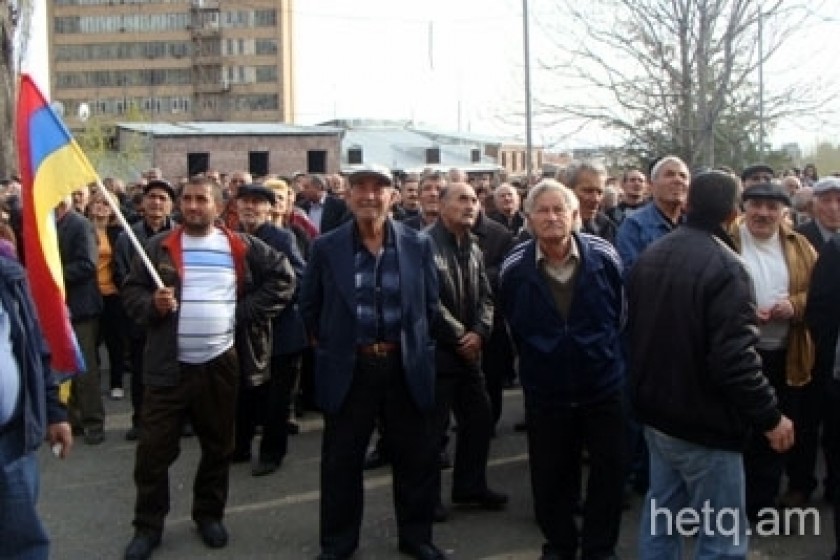
Does the Diaspora Have the Right to Criticize?
Today, the economic and political conditions in Armenia are a secret to no one. And it is not pessimistic idle talk to argue that if these conditions are allowed to continue, the future of the country will be severely threatened, especially its survival as an independent state collective.
It is abundantly clear to all that the most important and primary priority of worldwide Armenians is improving the socio-economic and political atmosphere in Armenia, the guaranteeing of its security and putting a halt to the exodus of the populace.
It is also clear that these issues for Armenians are even more vital than international recognition of the Genocide. Sadly, for a variety of reasons, intellectual circles in the diaspora, aside from some individuals, and diasporic news outlets, evade these issues and avoid any critical approach regarding them.
The issue that is constantly raised is that of Genocide recognition. Is such an approach justifiable? Will the silence of the diaspora have any positive impact on political life in Armenia? Of course not.
Many in Armenia and overseas want to reserve the right of criticizing the socio-economic and political situation in Armenia to the diaspora. But why? On the other hand, in the name of the future security of the Armenian people, the diaspora is obliged to do just this. It is the diaspora's patriotic duty.
From Soviet times, we have inherited the custom of warmly receiving and applauding official guests from Armenia. It is seen as being in bad taste to express criticism of various negative aspects of life in Armenia in their presence. But who wins as a result of such silence?
Today, we must not repeat the mistakes of the past. To a degree, intellectual circles in the diaspora are a capable force for change. If it were to support democratic and opposition movements in Armenia, at the right time and in the correct manner, many things in Armenia would change for the better.
Naturally, the diaspora is not capable of administering parliamentary oversight on the activities of the authorities. But, it can be critical and attempt to formulate societal oversight from the outside.
At one time even Armenia's First President Levon Ter-Petrosyan prohibited an individual from the diaspora from criticizing the dominant rules and regulations in Armenia. If he and his circle of supporters, who enjoyed the widespread confidence of the diaspora, were really democratic and transparent in their actions, he wouldn't have allowed himself to utter such a view.
In any event, any Armenian regardless of where he or she lives, who is concerned with the plight of the country has the right to criticize. You can even say it is their civil responsibility to do so.
The peoples of Europe have shed blood for this right. The Arab world and others have risen to their feet and are making sacrifices to achieve such a right. But such methods are destructive and should not serve as examples for Armenians.
It thus remains for all democratic forces to unite. They must stand with and mobilize the people who have lost any hope for positive change. The people are disillusioned and leaving Armenia.
Three years ago opposition forces in Armenia, with Ter-Petrosyan at the head, tried to effect regime change through the electoral process. But the movement wasn't pan-national in scope and failed.
It failed because Ter-Petrosyan wasn't the individual to insure confidence in the people and because he wasn't truly democratic and couldn't bring the country out of its crisis,
It failed because there was no program in the opposition platform to transform the government apparatus, to create parliamentary oversight, an independent judiciary or truly independent executive state bodies.
The list of shortcomings in their platform is endless.
At the May 28, 2011 HAK rally, Levon Ter-Petrosyan noted, "Why would a country that is regarded as an island of one time democracy and exemplary economic reforms see the day when the world speaks to it in such language, or for what transgression does a citizen of Armenia now find themselves in such a humiliating situation."
Ter-Petrosyan forgets that it was he and his friends who laid the groundwork for such a situation. They were the ones who willy-nilly privatized and sold-off government assets via non-transparent methods, all the while labeling such anarchy as "exemplary economic reforms".
The First President speaks of democracy in his public speeches. But this can only be regarded as demagoguery since his concept of democracy only translates into regime change.
But what actually will change if Ter-Petrosyan or someone else is substituted for Serzh Sargsyan.
He understands quite well that neither Serzh Sargsyan nor himself, or anyone else, can really create a democratic state without the overwhelming majority of the people and the existence of the above noted independent structures.
Thus, it is nonsense to speak of their benevolent wishes and aims, to force the rich to obey the laws of the land or to struggle against the corruption entrenched in the state apparatus.
Samvel Hovasapyan; Berlin
 Videos
Videos Photos
Photos
Comments (13)
Write a comment